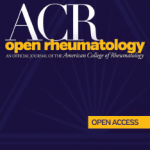This study used up-to-date techniques to perform an exhaustive immunologic description of cryoglobulins with regard to characterization and quantification…

Using RISE Data in Research
The ACR’s RISE registry offers answers on real-world experience to researchers.
What Causes Knee, Hip & Hand Osteoarthritis
Funck-Brentano et al. hypothesized that causal associations for osteoarthritis (OA) may differ by site, and they undertook this study to identify causal risk factors of knee, hip and hand OA.

Lupus Treatments: Into the Future
As the 21st century unfolds, rheumatologists will most likely transition from prescribing lupus patients broad immunosuppressants to more targeted treatment approaches. But to make this happen and advance research, the challenges experienced in lupus clinical trial design must be addressed…

Rheumatology Research Foundation Hosts Annual Investigators Meeting
The Rheumatology Research Foundation hosted the 13th annual Investigators Meeting in Washington, D.C., June 22‒23. The meeting provides Foundation-funded researchers with an opportunity to share updates on their studies, network, exchange ideas and collaborate on future projects to advance treatments and cures for rheumatic diseases. More than 50 rheumatology professionals were in attendance, with presentations…

New ACR Open Rheumatology Journal Delivers Science to Wide Audience
The ACR’s newest journal, ACR Open Rheumatology (ACROR), launched in 2019 with all articles published in full online. The journal publishes high-quality, rigorously peer-reviewed articles on original investigations in rheumatology research, including basic science, clinical science, epidemiology, health outcomes and education, as well as commentaries and reviews. Open access is on the rise. A 2017…
Long-Term Physical Activity Lowers the Risk of RA among Women
A new study adds to the evidence that metabolic factors play an important role in the pathogenesis of rheumatoid arthritis (RA). In this large, prospective cohort study, Liu et al. found that increased physical activity among women was associated with a reduced risk of RA…
Asthma, Allergic Disease, Passive Smoke Exposure & the Risk of RA
Rheumatoid arthritis (RA) is one of the most common autoimmune diseases. One hypothesis is that inflammation in the respiratory tract results in autoantibody formation that later leads to disease. Kronzer et al. set out to narrow the knowledge gaps related to the oral-respiratory factors that may mediate RA pathogenesis.

In Wake of Lupus Trial Failure, New Research Attacks From Many Angles
CHICAGO—When Richard Furie, MD, was first asked to speak about lupus at the 2019 ACR State-of-the-Art Clinical Symposium, held April 5–7, organizers suggested he discuss low disease activity and classification criteria. But Dr. Furie, a professor of medicine at the Donald and Barbara Zucker School of Medicine at Hofstra/Northwell, Hempstead, N.Y., and a veteran investigator…

The Microbiome: A Predictor of Autoimmune Response?
CHICAGO—The world of rheumatology is beginning to harness the promise of the microbiome, with evidence showing components of the gut may help predict response to medication and may be manipulated to improve how well a treatment works, said Jose Scher, MD, at the 2019 ACR State-of-the-Art Clinical Symposium, held April 5–7. “We can truly exploit…
- « Previous Page
- 1
- …
- 7
- 8
- 9
- 10
- 11
- …
- 77
- Next Page »